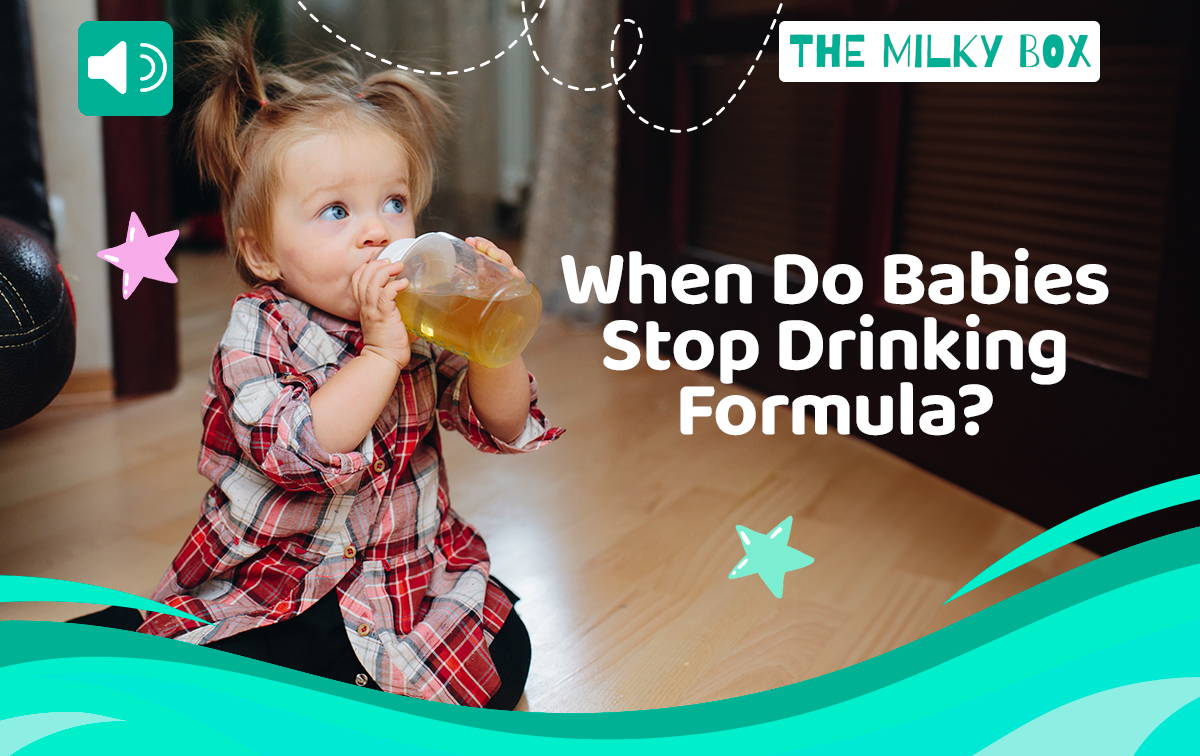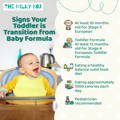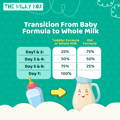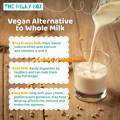The best time to offer solids is whenever you feel the calmest and most engaged. We recommend sitting as a family as often as possible for breakfast, lunch, and dinner this is sure to foster natural food curiosity.
When Do Babies Stop Drinking Formula?
By: Suzanne Renee' - Updated April 20, 2024 - 9 Minute Read

The initial days of having a newborn can be a flurry of activity, and before you realize it, your little one will be approaching their first birthday. As a parent of a formula-fed infant, you might be pondering when the right time is to switch to whole cow's milk and start introducing more solid foods and dairy products as alternatives.
This article addresses some of the most common questions during this transitional phase, such as when babies typically stop drinking formula and how to wean them appropriately.
When Should I Wean My Baby Off Formula?
As families consider weaning, they may think they must completely stop bottle feeding or breastfeeding cold turkey. However, weaning is best when it is a natural progression in your little ones’ development.
Weaning generally lasts four to six months as solid food is gradually introduced.
Nutritional Needs
Between four to six months, rapid growth and development will require more energy and nutrients than breast milk or bottle feeding can provide alone. Families will need to start adding solid foods to keep up with growing needs.
Please remember that your baby’s main nourishment should be breast milk or baby formula until they are 12 months old to meet the required specific nutrition, which can only be provided through breast milk, baby formula, or a combination.
Digestive System
Baby’s digestive systems before the 12 months are very immature, breastmilk and European baby formulas, designed to mimic breastmilk, offer gentle nourishment that is easy on delicate systems and settle gut flora while solid foods and sippy cups are introduced.
Baby-Led Weaning
There are many ways to introduce solids after four months. Feeding approaches such as baby-led weaning and pureed first baby foods are a wonderful place to start.
Do Babies Need Formula After 12 Months?
Starting at 12 months, Stage 3 or toddler formulas are designed to provide the extra nutritional boost you’d like to incorporate into the foods in your older baby’s diet. Although whole organic, pasture-raised cow’s milk is a safe, traditional, physician-approved suggestion, toddler milk’s only purpose is to meet your young child’s digestive, physical, and cognitive needs.
European toddler formula has more protein, vitamins, and minerals. It provides an easier transition to a healthy diet, especially if your baby has sensitivities or allergies that may be exacerbated by switching to whole cow milk.
Some stage 3 and stage 4 also offer prebiotics and probiotics to promote healthy gut flora making this adaptive food period even easier.
Vitamin D- Whole Milk
For children older than 12 months, plain whole cow's milk is a reliable source of vitamin D, and many cow's milks sold in stores are fortified with vitamin D.
A major benefit to Stage 3 and Stage 4 toddler formulas is that the nutrients far outweigh whole milk, and this includes vitamin D.
Complementing a toddler's diet instead of replacing it, European toddler formulas offer support for every system including Vitamins A & C to boost immune system response, Vitamin D, and iron to strengthen bone and joints, and naturally occurring Omega 3 and Omega 6 to help the brain development and eye tissue maturing.
Do Babies Drink Less Formula When They Start Solids?
Your baby or toddler may drink less after starting solids, but this transition will happen gradually.
Families and caregivers likely will not notice a substantial change in breast milk or bottle feeding for the first few months’ solids are introduced. Even at 12 months old, most babies still take up to 30 ounces of breast milk or formula daily.
Sippy Cups
Introducing a sippy cup is the perfect way to ensure your little one gets the hydration needed. Your little one should start replacing bottles with cups by their first birthday.
When you are ready to introduce a cup as an alternative to the breast or bottle, there are advantages to cup training earlier rather than later. Introducing a natural cup as soon as your little one can sit up helps your older baby or toddler gain mastery over their mouth muscles while fostering fine motor skills and coordination.
This learning time lets your older baby know other ways to find their favorite European toddler milk, breast milk, or even water, which further aids the weaning process.
If your child struggles to switch off a bottle and move to a toddler’s milk simultaneously, making one change at a time can help ease the adjustment. Remember, a sippy cup is best when made with the same clean materials as the non-toxic baby bottles your family trusts.
Is Your Baby Ready for Transitioning Away from Formula?
There are a few signs that you can look for to make sure your older baby is ready to transition from formula or breast milk. Talk with your child's pediatrician to ensure they get enough nutrients from their diet to wean off the old baby formula or breast milk.

How Do You Transition from Formula to Milk?
Parents may find that switching cold turkey from infant or follow-on formula to toddler milk is easy, especially when using the same European range. Some families, however, may find that their babies need more coaxing and time to switch from breast milk to whole cow’s milk as taste and textures vary greatly.
We recommend that a gentle transition over a few weeks is best, regardless of which bottle-fed baby moves. This allows your baby’s digestive system to adjust completely to the toddler formula or whole milk.
You may consider following a transition schedule that gradually mixes the old with the new:
🥛Day 1 & 2: 25% Toddler Formula or Whole Milk; 75% Old Formula
🥛Day 3 & 4: 50% Toddler Formula or Whole Milk; 50% Old Formula
🥛Day 5 & 6: 75% Toddler Formula or Whole Milk; 25% Old Formula
🥛Day 7: 100% Toddler Formula or Whole Milk

Milk Alternatives
If your child is moving away from a plant-based toddler formula or there is lactose allergy or intolerance your family may prefer a vegan alternative leaving out dairy milk altogether.
Soy
Parents and caregivers often think of fortified soy milk or unsweetened soy milk, especially when there are digestive worries. However, we suggest soy milk as a last choice only with your child’s pediatrician’s guidance.
The American Academy of Pediatrics recommends against using soy formula for infants and toddlers because of estrogen-like compounds called isoflavones that can adversely affect the immune and endocrine systems.
When children consume soy in substantial amounts, there are also risk factors for Kawasaki Disease and other developmental concerns.

Cow’s Milk Alternative
There are many other options available that will not place your toddler in harm’s way.
Pea protein milk may be an excellent choice for plant-based milk. A plain, unsweetened variety fortified with calcium and vitamins A and D is a good option. Oat milk can also be possible as it is easily digestible by toddlers and can help them stay full longer, and provides the necessary energy needed for busy bodies.
As always, check with your family medical provider to ensure all dietary requirements and essential nutrients are met.
Suggested Alternatives
Other drinks families look at include fruit juices of all kinds. There are children’s hospital recommended drinks that include juice but only in strict moderation.
Caregivers should make sure that their choice is 100 percent non-GMO fruit juice, preferably organic to reduce pesticide residues. Apple, orange, cranberry, or pomegranate are sweet enough and do not need added sugars to taste good.
They can provide some nutrients as part of a balanced transition from formula but just remember, intake of juice should be limited to, at most, 4 ounces daily for toddlers aged 1-3 and juices do not provide protein or fats.
Essential Nutrients
Transition from fully bottled or breastfed to a healthy solid diet does not happen overnight. European toddler milk can offer a nutritional and digestive option to fill gaps left by healthy food exploration.
The Milky Box is your trusted source of powdered formulas from birth all the way through the third year. Pure, clean EU certified nutrition without toxic or harmful ingredients.
Frequently Asked Questions
When is the best time in the day to give solids to a child who is still drinking formula/breast milk?
How much solid food should you give your child when they are still drinking breast milk or baby formula as their main source of nutrition?
Your child’s main source of nutrition will continue to be breast milk or formula for babies younger than 12 months. Expect bottles or breastfeeding to decrease gradually over that first year as the amount of food they eat increases slowly.
When should you transition to mostly solids?
This is really an individual choice. Most toddlers have developed physical skills, mature GI tract, and large enough stomach size to rely mostly on solid foods by around 15 months.
Keep in mind nutritionally, every baby is different, and it may be close to the 3rd birthday before your baby is ready to let go of all supplemental nutrition.
Disclaimer:
Please be aware that this information is based on general trends in babies, and it is not medical advice. Your doctor should be your first source of information and advice when considering any changes to your child’s formula and when choosing your child’s formula. Always consult your pediatrician before making any decisions about your child’s diet or if you notice any changes in your child.
Breastfeeding is the best nutrition for your baby because breast milk provides your child with all the essential nutrients they need for growth and development. Please consult your pediatrician if your child requires supplemental feeding.

Suzanne Renee' is an accomplished professional with extensive expertise in the area of infant nutrition, dedicated to promoting the health and wellbeing of children. She started this journey as a foster parent. Suzanne has emerged as a strong proponent of the European baby formula and has become a full time writer of the subject. In her free time, she enjoys camping, hiking and going to church.
Read Next:
Reviewed by Dr. Eric Wood, ND, MA

Dr. Wood is a licensed naturopathic doctor, with a doctorate degree from the Canadian College of Naturopathic Medicine in Toronto, Canada. He received his post-graduation certification in Mind Body Medicine at Harvard University.
With 15 years of experience, Dr. Wood is an Associate Professor of Holistic Nutrition at the American College of Health Sciences in Portland, Oregon. Dr. Wood is an educator, clinician, author, media figure, consultant, and owns his own holistic (naturopathic) medical practice in Ft. Lauderdale, Florida. Dr. Wood is currently researching and drafting books on cancer and pediatrics.
Outside of the medical profession, Dr. Wood loves singing with the Miami Lyric Opera and is an avid musician in South Florida. He also loves spending time with his wife and kids.

